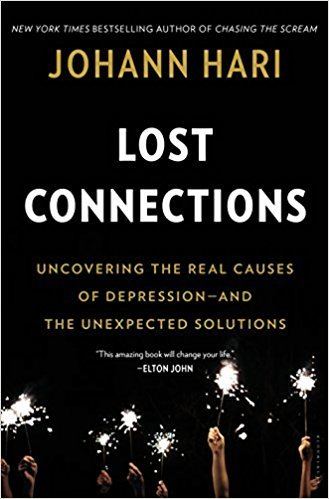It's capitalism that creates the need for so many antidepressants. Credit: Joe Raedle/Getty Images
We are a nation hooked on happy pills was the way the Daily Mail reported it recently. According to the OECD, prescription rates of antidepressants in the UK have trebled in the last 15 years. And we take twice as many antidepressants as they do in France and Italy and the Netherlands. But if you raise the question of why, or wonder if there is something concerning behind these figures, you will readily be accused of what is called ‘pill shaming’. Its one of those all-purpose Twitter insults that is employed to stop any kind of conversation about our use of anti-depressants and their effectiveness.
 Which is why you have to admire the courage of Johann Hari, who has knowingly walked right into the lion’s den with a new book, Lost Connections, on “the real causes of depression – and the unexpected solutions”, in which the unexpected solutions are more social than pharmaceutical. Hari has been no stranger to depression himself, nor to the drugs that are typically used to treat it. And while the anti-depressants that he took often had some short-term effect, what he began to notice was that, within a year or so, he was always back where he started.
Which is why you have to admire the courage of Johann Hari, who has knowingly walked right into the lion’s den with a new book, Lost Connections, on “the real causes of depression – and the unexpected solutions”, in which the unexpected solutions are more social than pharmaceutical. Hari has been no stranger to depression himself, nor to the drugs that are typically used to treat it. And while the anti-depressants that he took often had some short-term effect, what he began to notice was that, within a year or so, he was always back where he started.
The problem that people have in seeing though this common pattern, Hari explains, is that they are generally extremely committed to the story they have come to accept about their own pain. And, as a consequence, they are often highly threatened by any attempt to change the story. Hence all the accusations of ‘pill shaming’.
Back in 2011, when he was calling for the Pope to be arrested, Hari used to irritate me no end. Rightly or wrongly, I used to think that he was just another of those tiresome New Atheists, using his considerable critical skills to bash an easy target. The case against God is hardly difficult to make and it risks so little for a public intellectual to make it. But on his return from a time in the wilderness, Hari has started to take on some much more powerful gods, ones that are often and uncritically worshipped in our society. He is still intent on putting all forms of magic to the sword – and I’m sure his atheism is undimmed – but this time he is after the magic being sold by people in white lab coats and backed up by sales teams from pharmaceutical companies. This is the new version of organised religion. And those, like Hari, who have apostatised from a once-held faith in salvation by chemistry will be ferociously attacked. That’s what happens to apostates. I suspect Hari knew this and did it anyway. Respect.
The point about magic is that it is the promise of a short cut – to power, wealth or happiness. There is a shop in Brixton market where you can buy all sorts of potions to solve your love life or bring you success in business. Happy pills are not all that different. Both require belief – or, as scientists call it, the placebo effect.

At least, that is how they work much of the time, as Hari argues. Both promise an easy, pain-free, route to happiness; one that doesn’t require the sort of emotional hard work that might be required to fix your relationships or to mourn a loved one or to care more for your neighbours. For some people antidepressants do make a real and important difference. And when it comes to the misery of depression, anything that helps is to be welcomed. But there never will be a chemical fix for the misery of a highly individualised society or a community that had lost any sort of connection with itself.

 Main Edition
Main Edition US
US FR
FR






Join the discussion
Join like minded readers that support our journalism by becoming a paid subscriber
To join the discussion in the comments, become a paid subscriber.
Join like minded readers that support our journalism, read unlimited articles and enjoy other subscriber-only benefits.
Subscribe